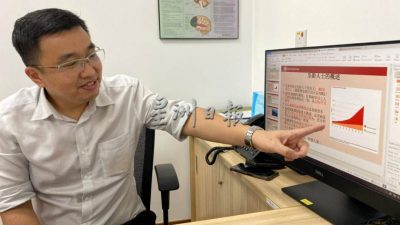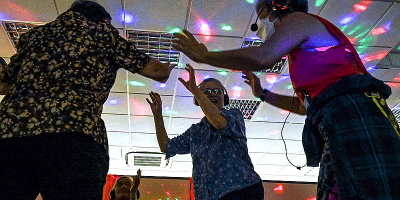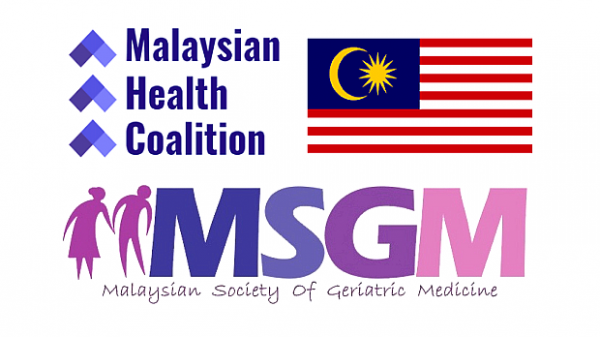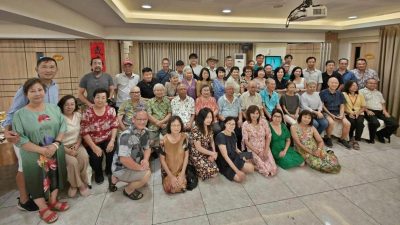Confirmation that our fifth prime minister Tun Abdullah bin Ahmad Badawi, fondly known as Pak Lah, is living with dementia throws a spotlight on a condition that affects nearly 300,000 Malaysians.
Related, Khairy Jamaluddin, the Minister of Health, acknowledged the gaps in care and services.
He pledged to increase investments in social care and proposed to set up a joint committee with the Ministry of Women, Family and Community Development.
We, persons with disabilities and disability advocates, in solidarity with persons living with dementia and their care partners, endorse these promising developments.
At the same time, more is needed to ensure that persons with dementia continue to live with dignity and meaning within the community.
We would like to offer our vision for a more inclusive Malaysia by outlining five key points to advance dementia response in Malaysia.
Dementia is a disability
By 2056, Malaysia will be a “super-aged society” with over 20% of its population above the age of 65.
The World Health Organization (WHO) lists dementia as a leading cause of disability and dependence in older persons 65 years and above.
Dementia is an umbrella term for the progressive loss of brain functioning that affects daily living skills, including cognitive, social and physical.
There is no cure for dementia at present. Yet, a medical model that focuses on the condition and treatment drives the dementia response.
A shift away from the medical model to a disability rights model is critical to materialize the social care mooted by the Minister of Health.
The disability rights model recognizes that physical and attitudinal barriers in society prevent people from social inclusion and access to services.
Removing these barriers paves the way for persons living with dementia and all persons with disabilities and care partners to live a life of dignity and self-determination.
Persons living with dementia can identify and register themselves as disabled under the Persons with Disabilities (PWD) 2008 Act, obtain the PWD card and access accommodations provided.
However, many do not wish to do so because once registered in the system, they become devalued and exposed to stigma and possible discriminatory practices and rights violations.
Only 611,168 out of an estimated 4.9 million PWDs in Malaysia are registered as of June 2022.
Although Malaysia has ratified the Convention on the Rights of Persons with Disabilities (CRPD), its policies, committees and programs still fail to protect the rights of all persons with disabilities and care partners. We are far from reaching a just nation for all.
Dementia and aging
Advanced age is the strongest risk factor for dementia, but it is not a normal part of aging.
The National Health and Morbidity Survey (2019) reported that 8.7% of older adults above 60 years are living with dementia.
The prevalence is expected to increase to around 11% as the country becomes an aging society, with a high prevalence of non-communicable diseases, and growing concerns about Long Covid and cognitive impairments.
The Malaysian government and society must recognize this imminent development and develop a national action plan that truly supports persons living with dementia to live within the community, and to their care partners with the necessary resources to do so.

Dementia and gender dimensions
Globally, more women than men live with dementia (female-to-male ratio of 1:69) as they live longer than men and comprise most older adults at advanced ages.
In Malaysia, 10% are women compared to 7% men.
Women – daughters, daughters-in-laws, spouses, sisters and female friends – make up two-thirds of unpaid family care partners worldwide. They experience physical, mental, social and financial impact, including developing dementia themselves.
The contributions of these unrecognized and ignored “second patients” account for half the estimated US$1.3 trillion cost of dementia care globally.
These facts highlight gender inequalities that harm women’s well-being, rights and progress.
Thus it is imperative that gender sensitivity and equity be central to the dementia response at all levels.
Meaningful engagement with persons living with dementia and care partners
The dementia experience is unique for every person and their care partners. Those in the early to mid-stages of dementia can live independently, if possible, with proper care and support.
Round-the-clock care will likely be necessary for late-stage dementia. Plus, those with younger onset dementia (below 65 years of age) have different needs.
As such, responses must see persons affected by dementia as a heterogeneous community and that response meets their expressed needs.
There cannot be a “one-size fits all” response. The best way to avoid this is to meaningfully engage people with lived experiences as key partners along with the other stakeholders.
It is their right to take part in decision-making processes that affect their lives, especially in care planning but also public policies and plans.
It was a missed opportunity and violation of rights that the development of the National Dementia Plan of Action which began in 2019, did not effectively engage persons living with dementia, care partners and families.
Our continuing advocacy for engagement has not received a concrete response thus far.
Legal rights of persons living with dementia
Currently, in Malaysia, many legislations consider persons with psychosocial and intellectual disabilities as people with unsound minds and incapable of making legal decisions.
The provisions under the Mental Health Act 2001 are insufficient to ensure the legal rights of persons with dementia and other disabilities.
This contradicts the CRPD which recognizes the right of persons with disabilities (including dementia) to autonomy and legal capacity.
This also hinders the dignified and meaningful engagement of persons with dementia in their care plan, livelihood and policy decision-making.
In fact, persons living with dementia can exercise their legal capacity with supported decision-making mechanisms and advance directives.
It is imperative for Malaysia to make such legislative provisions, such as the Mental Capacity Act in the UK and Singapore, for persons with dementia and other disabilities to exercise their autonomy and legal capacity.
Our vision
Older adults with dementia go through two progressions; aging and dementia. The challenge of dementia pushes holistic care and support to a higher level.
As such, if Malaysia gets it right with dementia and disability responses, it will do well in meeting the needs of older adults in general. And the nation will be successful in managing the imminent aging society.
While we support the proposed joint inter-ministerial committee and learning best practices from other countries, we also urge all policy-makers, government agencies, healthcare professionals, dementia service providers and social workers to listen to the lived experiences of persons with dementia, as they are the key experts who know the types of care and services that they need.
We sincerely hope that moving forward, Malaysia will become a nation that is:
– dementia positive, where people and systems appreciate the retained strengths and abilities of persons living with dementia, treat them and their care partners with dignity and respect, and honor their rights to social inclusion,
– dementia competent, where diverse healthcare and social services and facilities are equipped with enough providers and staff who are dementia-sensitive and have the right knowledge, skill sets and attitude to meet the expressed needs of persons with dementia, care partners and families; and
– dementia inclusive, in which the whole of society knows about dementia, knows how to interact with and support them, provides a safe and accessible physical and social environment, at the same time ensuring the opportunities and access for persons living with dementia and care partners to continue to engage in the society free from stigma, discrimination, exploitation and violations of rights.
(Disability Rights Cluster is a part of the CSO Platform for Reform, a coalition of 102 CSOs based in Malaysia focusing on institutional reforms.)
ADVERTISEMENT
ADVERTISEMENT





































